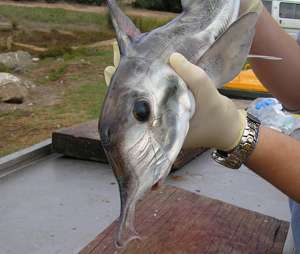Whole-genome sequencing of the elephant shark offers insights into bone disease and immunity in humans

Sequencing the genomes of vertebrates can provide scientists with valuable clues about the evolution of the human genome. By analyzing and comparing different genomes, researchers can pinpoint variations in genes and proteins to help uncover the ways in which vertebrates have evolved and diverged from each other over time.
Recently, Byrappa Venkatesh at the A*STAR Institute of Molecular and Cell Biology, Singapore, together with co-workers across Asia, the United States, Canada and Europe, sequenced the entire genome of Callorhinchus milii—also known as the elephant shark. Their results reveal traits in the elephant shark—specifically, a lack of bone formation and an unusual immune system—that have wide-ranging implications for human medical science.
"Most shark-family genomes are larger than the human genome and would be difficult to sequence and assemble," explains Venkatesh. "After a long search, we identified the elephant shark, whose genome is one-third of the size of the human genome—giving us a viable target for whole-genome sequencing. This shark is also a good candidate for investigating the ancestry of all jawed vertebrates."
The elephant shark is a member of the cartilaginous fish family, which diverged from bony vertebrates around 450 million years ago and have skeletons largely comprised of cartilage. Through their study, Venkatesh and his team were able to confirm that the elephant shark is the slowest evolving of all known vertebrates, including the 'living fossil' coelacanth fish.
By comparing the elephant shark and human genomes, the team discovered that the shark is missing a key gene family responsible for bone formation. "From humans and other bony vertebrates, we already know that the genes in this family are involved in generating bone," states Venkatesh. "However, confirmation that they are absent in the elephant shark makes these genes prime candidates in human bone diseases."
The researchers also uncovered a surprising feature of the elephant shark's immune system. Interestingly, the shark has only one type of immune 'helper cell' and is missing the more specialized T-cells found in humans and other vertebrates. T-cells are a type of white blood cell that provide defense against viral and bacterial infections and are thought to be crucial for fighting autoimmune diseases.
"Since elephant sharks seem capable of living long and healthy lives without the elaborate T-cells found in humans, it is plausible they use alternative mechanisms of immunity," explains Venkatesh. "Understanding these mechanisms may help to develop novel strategies for improving immunity in humans in the future."
More information: Venkatesh, B., Lee, A. P., Ravi, V., Maurya, A. K., Lian, M. M. et al. "Elephant shark genome provides unique insights into gnathostome evolution." Nature 505, 174–179 (2014). dx.doi.org/10.1038/nature12826
Journal information: Nature



















